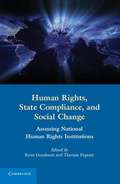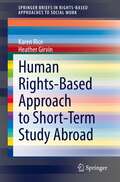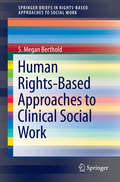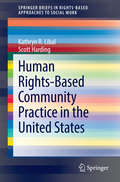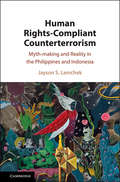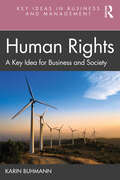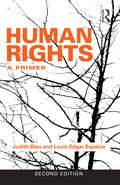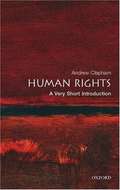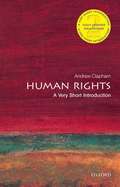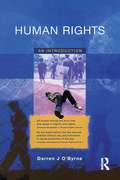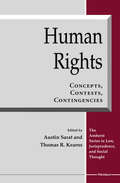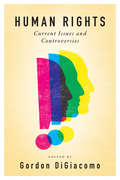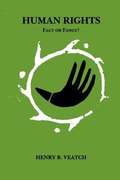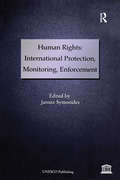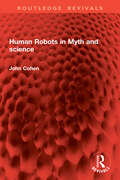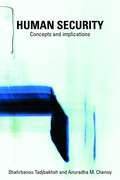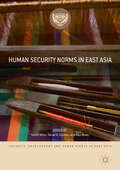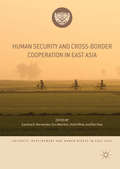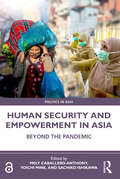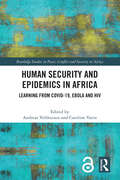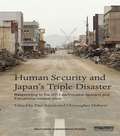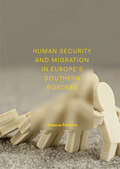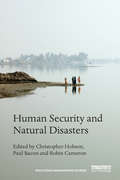- Table View
- List View
Human Rights, State Compliance, and Social Change
by Thomas Pegram Ryan GoodmanNational Human Rights Institutions (NHRIs) - human rights commissions and ombudsmen - have gained recognition as a possible missing link in the transmission and implementation of international human rights norms at the domestic level. They are also increasingly accepted as important participants in global and regional forums where international norms are produced. By collecting innovative work from experts spanning international law, political science, sociology and human rights practice, this book critically examines the significance of this relatively new class of organizations. It focuses, in particular, on the prospects of these institutions to effectuate state compliance and social change. Consideration is given to the role of NHRIs in delegitimizing - though sometimes legitimizing - governments' poor human rights records and in mobilizing - though sometimes demobilizing - civil society actors. The volume underscores the broader implications of such cross-cutting research for scholarship and practice in the fields of human rights and global affairs in general.
Human Rights-Based Approach to Short-Term Study Abroad (SpringerBriefs in Rights-Based Approaches to Social Work)
by Karen Rice Heather GirvinShort-term study abroad experiences are on the rise across social work programs. This increase is fueled by the Educational Policy and Accreditation Standards of the Council on Social Work Education (CSWE) that social work programs graduate students who are ready to engage diversity and function ethically as global citizens who understand mechanisms of oppression. With the increasing number of short-term study abroad trips, this brief offers a framework that provides strategies for empowering the populations and communities in which these trips occur. Developing short-term study abroad trips from a human rights-based framework rather than a needs-based approach is urgent and necessary, as the community in which the visit will occur is placed at the center of planning efforts and its members become equal and active participants. The brief is accessible and relevant to both instructors and students, with thoughtful emphasis placed in each chapter to align with the needs of each group more distinctly. It is conceived with both travel-based (field education) and classroom learning (pre-trip preparation) in mind. Though developed with more depth, theory, and evidence than a "how-to manual," the brief serves as an exemplary "guide" that prepares those engaging in short-term study abroad trips with information and strategies that are derived from the key concepts of a rights-based approach to field education. Human Rights-Based Approach to Short-Term Study Abroad is essential reading that engages students and faculty with case examples to illuminate the complex concepts that are taught by faculty as well as specific exercises and assignments to guide both faculty and student through the process of developing and implementing short-term study abroad trips. This brief is of immediate relevance for undergraduate and graduate coursework in field education, international social work, human rights, global social work, and macro social work, as well as useful for any practitioner seeking CSWE accreditation.
Human Rights-Based Approaches to Clinical Social Work
by S. Megan BertholdThis groundbreaking Brief brings a rights-based perspective to social work as opposed to the charity- and needs-based formats traditional to the field. Core principles for effective practice are discussed in the context of global human rights advocacy, from addressing individuals' immediate issues to challenging the structures that allow continued injustices to marginalized populations. Focusing specifically on interventions with survivors (and some perpetrators) of torture, human trafficking, and domestic violence, coverage explores and explodes myths about these issues--some of which survivors themselves may believe--and illustrates the immediate application and long-term benefits of rights-based therapy. Case examples, discussion questions, resource links, and a clinician self-care section reinforce the salience of this approach, modeling practice that is ethical in its outlook and empowering in its healing. Clinician skills emphasized in Human Rights-Based Approaches to Clinical Social Work: Reframing client needs as human rights. Cultural humility versus cultural competence. Building the therapeutic relationship and reconstructing safety. Developing trauma-informed practice and avoiding re-traumatization. Forensic and activist roles for social workers. Burnout prevention for practitioners.
Human Rights-Based Community Practice in the United States
by Kathryn R. Libal Scott HardingA transformative model for community social work rooted in basic social and economic rights is the basis of this timely Brief. With specific chapters spotlighting the rights to health care, nutritious food, and adequate and affordable housing, the book describes in depth the role of community practice in securing rights for underserved and vulnerable groups and models key aspects of rights-based work such as empowerment, participation, and collaboration. Case examples relate local struggles to larger regional and statewide campaigns, illustrating ways the book's framework can inform policymakers and improve social structures in the larger community. This rights-based perspective contrasts sharply with the deficits-based approach commonly employed in community social work, and has the potential to inspire new strategies for addressing systemic social inequality. Features of Human Rights-Based Community Practice in the United States: A conceptual basis for a rights-based approach to community practice. Detailed analysis of legal and social barriers to health care, housing, and food. Examples of effective and emerging rights-based community interventions. Methods for assessing the state of human rights at the community level. Documents, discussion questions, resource lists, and other valuable tools.
Human Rights-Compliant Counterterrorism: Myth-making and Reality in the Philippines and Indonesia
by Jayson S. LamchekSince 9/11, we have lived in an age of counterterrorism in which the spectre of terrorism justifies increasingly repressive and violent measures. Against this backdrop, legal scholars and human rights advocates have encouraged integration of human rights into the discourse of counterterrorism as the best way to counter such repression and violence. This book challenges that received wisdom by showing the ambiguous effects of such converged discourse on developing countries. It highlights the effect of terrorism discourse on human rights in two developing countries, viz., the Philippines and Indonesia, the efforts of local advocates in resisting abuses in the name of counterterrorism, and the persistence of violations despite legal and policy reforms in those countries. Applying a novel analytic framework drawn from critical terrorism studies and critical international law, the book provokes new thinking on the future of human rights advocacy in the age of counterterrorism.
Human Rights: A Key Idea for Business and Society (Key Ideas in Business and Management)
by Karin BuhmannHuman rights is an interdisciplinary subject as well as a foundational aspect of the law. The importance of human rights at the intersection of business and society is central, yet under-analyzed. This book provides an accessible understanding of what human rights are, how business enterprises may impact human rights for better or for worse, and how such impacts can or should be managed. Human Rights: A Key Idea for Business and Society equips readers interested in the relationship between business and society with the foundational knowledge for engaging in debates and operational tasks related to the roles and responsibilities of business with regard to human rights. It covers human rights aspects relevant to common management tasks, including supply chain management, human resource management, risk management, non-financial reporting, finance, and stakeholder engagement. It covers opportunities and challenges related to the Sustainable Development Goals (SDGs) and climate change mitigation. The book explains the foundations for human rights, social expectations, and legal requirements on businesses to respect human rights and how business enterprises should identify and manage their human rights impacts. A concise introduction to a complex topic, this book is perfect reading for students of corporate social responsibility, business ethics, and international business, as well as an illuminating guide for researchers, managers, civil society organizations, government officials, and reflective practitioners.
Human Rights: A Primer
by Judith Blau Louis Edgar EsparzaHuman Rights: A Primer breaks new ground in clarifying for undergraduates the international significance of human rights. This new edition highlights current and recent developments, using themes familiar to undergraduates. For example, Americans are increasingly aware of the growing disparities in economic well-being. It is indeed a crisis that is global and national. Because this book focuses on globalization and human rights as intertwined, readers will gain a comprehensive understanding of the role of neoliberal capitalism in undermining human rights (dignity, security, and well-being). Major works by Thomas Piketty and Joseph Stiglitz are discussed, along with recent upheavals in Greece, and the rising tide of refugees in Europe and North America. Furthermore, powerful forces that will increasingly test global solidarity and the future of the planet relate to the extent that countries and peoples cooperate in combating global warming and promoting sustainable development goals (SDGs). Key dates for both these issues occurred in the second half of 2015 – the UN Sustainable Development Summit in September and the Paris Climate Conference (COP21) in December. The significance of both conferences for human rights is discussed in this new edition.
Human Rights: A Very Short Introduction
by Andrew ClaphamFrom the controversial incarceration of prisoners at Guantanamo Bay, to the brutal ethnic cleansing being practiced in Darfur, to the widespread denial of equal rights to women in many areas of the world, human rights violations are a constant presence in the news and in our lives. Taking an international perspective, and focusing on highly topical issues such as torture, arbitrary detention, privacy, health, and discrimination, this Very Short Introduction will help readers to understand for themselves the controversies and complexities behind this vitally relevant issue. Looking at the philosophical justification for rights, the historical origins of human rights and how they are formed in law, Andrew Clapham explains what our human rights actually are, what they might be, and where the human rights movement is heading.
Human Rights: A Very Short Introduction (Second Edition) (Very Short Introductions)
by Andrew Clapham<p>Today it is usually not long before a problem gets expressed as a human rights issue. Indeed, human rights law continues to gain increasing attention internationally, and must move quickly in order to keep up with a social world that changes so rapidly. <p>This Very Short Introduction, in its second edition, brings the issue of human rights up to date, considering the current controversies surrounding the movement. Discussing torture and arbitrary detention in the context of counter terrorism, Andrew Clapham also considers new challenges to human rights in the context of privacy, equality and the right to health. Looking at the philosophical justification for rights, the historical origins of human rights and how they are formed in law, Clapham explains what our human rights actually are, what they might be, and where the human rights movement is heading.</p>
Human Rights: An Anthropological Reader
by Mark GoodaleThis innovative reader brings together key works that demonstrate the important and unique contributions anthropologists have made to the understanding and practice of human rights over the last 60 years. Draws on a range of intellectual and methodological approaches to reveal both the ambiguities and potential of the postwar human rights project. Brings together essays by both contemporary luminaries and seminal figures to provide a rich introduction to the subject. Supplemented with selected international human rights documents and links to websites on human rights.
Human Rights: An Introduction (Sociology For Globalizing Societies Ser. #5)
by Darren O'ByrneHuman Rights: An Introduction is an important text that provides a comprehensive overview of human rights and related issues from a social science perspective. First, this book does more than discuss theory, it uses case studies and personal testimonies in the debate. Human rights as an area of academic interest cannot be easily divorced from human rights struggles and the reality of contemporary conditions.Second, the book is aimed at what is an emerging and growing cross-disciplinary field of study. Human rights issues are increasingly coming to the fore in a number of academic debates. Whereas the study of human rights has traditionally been included in departments of law, international relations and philosophy, a number of courses are now being set up in departments of sociology and anthropology. Consequently, there is an increasing need to bring these disparate approaches together.
Human Rights: Concepts, Contests, Contingencies
by Austin Sarat Thomas R. KearnsToday the language of human rights, if not human rights themselves, is nearly universal. Human Rights brings together essays that attend to both the allure and criticism of human rights. They examine contestation and contingency in today's human rights politics and help us rethink some of the basic concepts of human rights. Questions addressed in Human Rights include: Can national self-determination be reconciled with human rights? Can human rights be advanced without thwarting efforts to develop indigenous legal traditions? How are the forces of modernization associated with globalization transforming our understanding of human dignity and personal autonomy? What does it mean to talk about culture and cultural choice? Is the protection of culture and cultural choice an important value in human rights discourse? How do human rights figure in local political contests and how are those contests, in turn, shaped by the spread of capitalism and market values? What contingencies shape the implementation of human rights in societies without a strong tradition of adherence to the rule of law? What are the conditions under which human rights claims are advanced and under which nations respond to their appeal?
Human Rights: Current Issues And Controversies
by Gordon DiGiacomoWritten largely by Canadian scholars for Canadian readers, this overview of contemporary human rights concerns introduces the human rights instruments—provincial, national, and international—which protect Canadians. The volume begins with an outline of the history of human rights before moving on to discuss such important topics as the relationship between political institutions and rights protection, rights issues pertaining to specific communities, and cross-cutting rights issues that affect most or all citizens. Contemporary and comprehensive, Human Rights: Current Issues and Controversies is a valuable resource for anyone interested in learning more about human rights.
Human Rights: Fact or Fancy?
by Henry B. VeatchHenry B. Veatch finds the basis for human rights in natural law. He builds his argument step by step, carefully laying the foundation for his central assertion that our basic rights are discoverable directly in the facts of nature.
Human Rights: International Protection, Monitoring, Enforcement
by Janusz SymonidesThe series of volumes prepared by UNESCO for teaching human rights at higher education level comes to a successful conclusion with the publication of this volume. Human Rights: International Protection, Monitoring, Enforcement takes an institutional approach to the international protection of human rights, examining first the United Nations system, which may be seen as universal, and then analysing regional systems of protection. An indispensable source of information on the protection of human rights, the volume can also be employed as a practical guide to the use of existing procedures in the defence of human rights.
Human Robots in Myth and science (Routledge Revivals)
by John CohenFirst published in 1966, in Human Robots in Myth and Science, the author traces the idea of the robot from antiquity until the present day (1960s) and sketches the lines of its likely development in the future. Modern science, like science fiction, is deeply concerned with the idea of a robot or self-regulating artifact which operates without human aid. Ultra rapid computers, pilotless planes, and automated factories straight away come to mind, but there are numberless other automatic devices.As John Cohen probes this exciting theme it becomes increasingly clear that the notion of a robot has had far reaching repercussions in the history of science, philosophy and literature and in the growth of industry. In his analysis of the motives of robot makers throughout the ages, the author distinguishes the impulse which challenges the gods themselves from the merely utilitarian urge. There is a vast difference between the age-old quest for technical skill and the desire to wrest from the gods the secret of making a man. The topic is treated historically, beginning with Biblical, Egyptian, Greek and other antique robots and their significance and followed by a description of the ‘man-made men’ of medieval science, alchemy and fiction. The theory of robots come into its own in the seventeenth century and its application, in craftsmanship in industry, in the eighteenth century. It is only in the recent past however, that the world of robots has begun to flourish in an ever-growing scale. In the age of AI, this historical reference work is a must read for scholars and researchers of history, philosophy and literature.
Human Security Concepts and implications: Concepts and implications (Routledge Advances in International Relations and Global Politics)
by Shahrbanou Tadjbakhsh Anuradha M. ChenoyTracing the key evolutions in the development of the concept of human security, this book explores the various definitions and critiques, how it relates to other concepts, and what it implies for polities, politics, and policy. Human security is an important subject for the whole world, in particular Asia, as it deals with interactions among fields of social change, such as development, conflict resolution, human rights, and humanitarian assistance. In a globalizing world, in which threats become trans-national and states lose power, security can no longer be studied in a one-dimensional fashion. Written by authors who are experts in this field and with case studies from different regions (Afghanistan, Central Asia and South Asia) presented throughout, this book contributes to this new multidimensional conception of security, analyses its strengths and weaknesses, and focuses on its implications for analysis and action.
Human Security Norms in East Asia (Security, Development and Human Rights in East Asia)
by Yoichi Mine Oscar A. Gómez Ako MutoThis book reveals how the idea of human security, combined with other human-centric norms, has been embraced, criticized, modified and diffused in East Asia (ASEAN Plus Three). Once we zoom in to the regional space of East Asia, we can see a kaleidoscopic diversity of human security stakeholders and their values. Asian stakeholders are willing to engage in the cultural interpretation and contextualization of human security, underlining the importance of human dignity in addition to freedom from fear and from want. This dignity element, together with national ownership, may be the most important values added in the Asian version of human security.
Human Security and Cross-Border Cooperation in East Asia (Security, Development and Human Rights in East Asia)
by Eun Mee Kim Yoichi Mine Carolina G. Hernandez Ren XiaoThis book takes up a wide variety of human security challenges beyond the dimension of human conflict, and looks at both natural and human disasters that the East Asian region faces or is attempting to resolve. While discussing various human security issues, the case studies offer practical lessons to address serious human security challenges in the framework of the ASEAN Plus Three and beyond. Against the backdrop of multifaceted globalization and parochial reactions thereto, this book is a powerful contribution to universal human security.
Human Security and Empowerment in Asia: Beyond the Pandemic (Politics in Asia)
by Mely Caballero-Anthony, Yoichi Mine, and Sachiko IshikawaIn the context of the COVID-19 pandemic, this edited volume revisits the framework of human security and development. It examines the protection-empowerment nexus as applied to various vulnerable groups and populations affected by the pandemic. While the conventional human security literature has focused on top-down protection, this book offers new perspectives on human security by exploring bottom-up empowerment from both theoretical and practical perspectives. It also encourages readers to rethink the agency of vulnerable people in addressing the challenges posed by the pandemic. Through eight case studies from Southeast Asia and Japan, the contributors to this book demonstrate the importance of empowerment in achieving human security. They focus on the responses of vulnerable groups and communities to multiple threats to their lives, livelihoods, and dignity. The chapters discuss key human security concerns, such as poverty, the environment, food, forced migration, gender, health, aging, peace, and justice – all of which have been compounded and exacerbated by the COVID-19 pandemic. An essential resource for students and scholars of human security in the aftermath of COVID-19 and its wider impacts. The Open Access version of this book, available at http://www.taylorfrancis.com, has been made available under a Creative Commons Attribution-Non Commercial-No Derivatives (CC-BY-NC-ND) 4.0 license.
Human Security and Empowerment in Asia: Beyond the Pandemic (Politics in Asia)
by Mely Caballero-Anthony, Yoichi Mine, and Sachiko IshikawaIn the context of the COVID-19 pandemic, this edited volume revisits the framework of human security and development. It examines the protection-empowerment nexus as applied to various vulnerable groups and populations affected by the pandemic.While the conventional human security literature has focused on top-down protection, this book offers new perspectives on human security by exploring bottom-up empowerment from both theoretical and practical perspectives. It also encourages readers to rethink the agency of vulnerable people in addressing the challenges posed by the pandemic. Through eight case studies from Southeast Asia and Japan, the contributors to this book demonstrate the importance of empowerment in achieving human security. They focus on the responses of vulnerable groups and communities to multiple threats to their lives, livelihoods, and dignity. The chapters discuss key human security concerns, such as poverty, the environment, food, forced migration, gender, health, aging, peace, and justice – all of which have been compounded and exacerbated by the COVID-19 pandemic.An essential resource for students and scholars of human security in the aftermath of COVID-19 and its wider impacts.The Open Access version of this book, available at www.taylorfrancis.com, has been made available under a Creative Commons Attribution-Non Commercial-No Derivatives (CC-BY-NC-ND) 4.0 license. Funded by JICA Ogata Sadako Research Institute for Peace and Development.
Human Security and Epidemics in Africa: Learning from COVID-19, Ebola and HIV (Routledge Studies in Peace, Conflict and Security in Africa)
by Caroline Varin Velthuizen, Edited by AndreasThis book examines the impact of epidemics in Africa, exploring some of the adaptation and crisis management strategies adopted to tackle COVID-19, Ebola, and HIV-AIDS. The authors reflect on lessons learned from solving complex problems and difficult decisions made by leaders on pandemic management to shape the security environment and, thus, the well-being of people living in Africa for years to come.Drawing on cases from across the continent, the book demonstrates that, significantly, during the COVID-19 pandemic, African countries and communities frequently displayed regional solidarity, creativity in decision-making, decisiveness in dealing with corruption and opportunism, and resilience and discipline in implementation. Adopting a human security framework, the authors share their lived experiences and explore the impact of epidemics on public policy decision-making, foreign policy implementation, global relations, collaboration in the community dimension, and, ultimately, the future of socio-economic development in Africa.This book will be a welcome addition for practitioners and researchers across the fields of security studies, health management, and African studies, making an essential contribution to the security discourse in a post-COVID world.
Human Security and Japan's Triple Disaster: Responding to the 2011 earthquake, tsunami and Fukushima nuclear crisis (Routledge Humanitarian Studies)
by Paul Bacon Christopher HobsonJapan has been one of the most important international sponsors of human security, yet the concept has hitherto not been considered relevant to the Japanese domestic context. This book applies the human security approach to the specific case of the earthquake, tsunami and nuclear accident that struck Japan on 11 March 2011, which has come to be known as Japan's ‘triple disaster’. This left more than 15,000 people dead and was the most expensive natural disaster in recorded history. The book identifies the many different forms of human insecurity that were produced or exacerbated within Japan by the triple disaster. Each chapter adds to the contemporary literature by identifying the vulnerability of Japanese social groups and communities, and examining how they collectively seek to prevent, respond to and recover from disaster. Emphasis is given to analysis of the more encouraging signs of human empowerment that have occurred. Contributors draw on a wide range of perspectives, from disciplines such as: disaster studies, environmental studies, gender studies, international relations, Japanese studies, philosophy and sociology. In considering this Japanese case study in detail, the book demonstrates to researchers, postgraduate students, policy makers and practitioners how the concept of human security can be practically applied at a policy level to the domestic affairs of developed countries, countering the tendency to regard human security as exclusively for developing states.
Human Security and Migration in Europe’s Southern Borders (Politics Of Citizenship And Migration)
by Susana FerreiraThis book examines the management of migratory flows in the Mediterranean within an international security perspective. The intense migratory flows registered during the year 2015 and the tragedies in the Mediterranean Sea have tested the mechanisms of the Union’s immigration and asylum policies and its ability to respond to humanitarian crises. Moreover, these flows of varying intensities and geographies represent a threat to the internal security of the EU and its member states. By using Spain and Italy as case studies, the author theorizes that the EU, given its inability to adopt and implement a common policy to effectively manage migratory flows on its Southern border, uses a deterrence strategy based on minimum common denominators.
Human Security and Natural Disasters (Routledge Humanitarian Studies)
by Christopher Hobson, Paul Bacon and Robin Cameron"Human security" is an approach that rejects the traditional prioritization of state security, and instead identifies the individual as the primary referent of security. It offers a way of broadening our perspective, and recognizing that the most pressing threats to individuals do not come from interstate war, but from the emergencies that affect people every day, such as famine, disease, displacement, civil conflict and environmental degradation. Human security is about people living their lives with dignity, being free from "fear" and "want". To date, there has been a strong tendency to focus on insecurity caused by civil conflict, with less attention on issues to do with environmental security. This volume addresses the threat posed by natural disasters, which represent an increasingly major human security threat to people everywhere. In looking at natural disasters, this book also refines the human security approach. It does so through developing its previously unexplored interdisciplinary potential. This volume explicitly seeks to bring the human security approach into conversation with contributions from a range of disciplines: development, disaster sociology, gender studies, international law, international relations, philosophy, and public health. Collectively these scholars unpack the "human" element of "natural" disasters. In doing so, an emphasis is placed on how pre-existing vulnerabilities can be gravely worsened, as well as the interconnected nature of human security threats. The book presents a variety of case studies that include the Indian Ocean tsunami, Hurricane Katrina, the 2010 Haiti earthquake, and the 2011 "triple disasters" in Japan.
